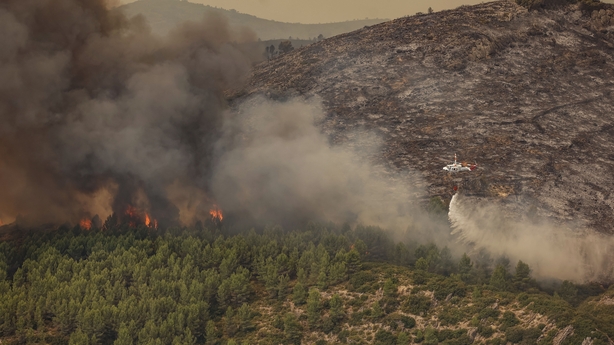Firefighters in Spain and Portugal are battling to control multiple forest fires across the Iberian Peninsula with blazes in the Serra da Estrela park resuming just days after being brought under control.
Strong winds have been hampering attempts to combat the spread of the fire, one of 195 that have ravaged some 92,000 hectares of land across Portugal this year amid record temperatures.
The fire in the UNESCO-designated park restarted yesterday after being brought under control five days earlier, and is estimated to have already consumed around 25,000 hectares of land.
More than 1,200 firefighters remained on the ground in response to the threat backed up by eight fire-fighting aircraft.
Authorities had declared some 90% of the park under control by midday, but fire crews are now working to "consolidate" the blaze, fire brigade commander Miguel Cruz said at a briefing.
A firefighter involved in tackling a separate blaze in central Caldas da Rainha died of a heart attack, officials said.
July proved to be Portugal's hottest in nearly a century, with the country battling its worst forest fires since 2017 when around 100 lives were lost.
Scientists say human-induced climate change is contributing to extreme weather events, including wildfires and heatwaves.
Neighbouring Spain has also been battling a wave of forest fires in recent weeks following soaring temperatures there.
The eastern Valencia region is struggling with two major blazes, one in Bejis, 70km northwest of Valencia city, which began Monday and has grown rapidly. It burnt up 10,000 hectares of land and forced the evacuation of 1,500 people, regional officials say.
But the weather offered some respite some 200km further south when a storm broke over the Vall de Ebo where hundreds more firefighters have been tackling another major blaze since Saturday.
As rain and hail pummelled the area where the flames have devastated more than 11,000 hectares, all 30 aerial firefighting teams were grounded, although it raised hopes the wet weather could dampen the surging flames.
Yesterday, a fire injured at least ten passengers on a train in Bejis, after several panicked and got off as flames approached the tracks, emergency services said.
The driver managed to reverse the train, which had been bound for Zaragoza, and return safely to Valencia city station.

Portugal's largest conservation area
In Portugal, the Serra da Estrela fire started on 6 August outside the central town of Covilha with authorities deploying 390 fire engines and 14 planes and helicopters in efforts to control it.
Firefighters, who hope to keep the fire from spreading further before temperatures rise again on Friday, have thrown a 160km cordon around the area.
Residents in Orjais village in the foothills of the mountain range helped fight back the flames which came dangerously close to their homes.
Authorities are concerned about the impact of the fire on wildlife, as Serra da Estrela is Portugal's largest natural conservation area known for its diverse wildlife, including wildcats and lizards.
"We have not yet reached the end of this critical period for fires," Interior Minister Jose Luis Carneiro warned after meeting with meteorologists.
The upcoming heatwave is forecast to last into September, which Carneiro said was set to be drier and hotter than usual.
Meanwhile, Algeria's interior minister said at least 26 people were killed and dozens injured in forest fires that ravaged parts of the north of the country.
The minister, Kamel Beldjoud, told state television that 24 people lost their lives in fires in El Tarf, near the border with Tunisia, in addition to two others who died earlier in Setif.
Climate change driving unprecedented forest fire loss
Forest fires supercharged by climate change are burning twice as much global tree cover as 20 years ago, according to data showing the equivalent of 16 football pitches are now lost every minute.
The research showed in unprecedented detail how wildfires have progressed over the past two decades, with the blazes claiming an estimated three more million hectares each year - an area the size of Belgium - compared with 2001.
The study showed that the majority of tree cover loss is occurring in the boreal forests that blanket much of Russia, Canada and Alaska, which are among the largest storers of carbon on Earth.
Researchers from the University of Maryland used satellite imagery to map areas of tree cover lost, including that burned by what are known as stand-replacing forest fires.
These are fires that kill all or most of the forest's canopy and which cause long-term changes to forest structure and soil chemistry.
The data showed 2021 to be one of the worst years for forest fires since the turn of the century, causing 9.3 million hectares of tree cover loss globally.
That was more than a third of all the forest lost last year, according to the data, compiled by Global Forest Watch and the World Resources Institute research group.
"Forest fires are getting worse worldwide," James McCarthy, research analyst at Global Forest Watch, told AFP.
The European Union's satellite monitoring service said last week that western Europe had experienced record fire activity so far in 2022, with tens of thousands of hectares of forest lost in France, Spain and Portugal.
The researchers said that climate change was likely a "major driver" in increased fire activity, with extreme heat waves that render forests tinder dry already five times more likely today than a century and a half ago.
These drier conditions lead to higher emissions from fires, further exacerbating climate change as part of a "fire-climate feedback loop", they said.
Read more:
Violent storms hammer France after weeks of drought
China races to alleviate drought, power cuts amid record heatwave


